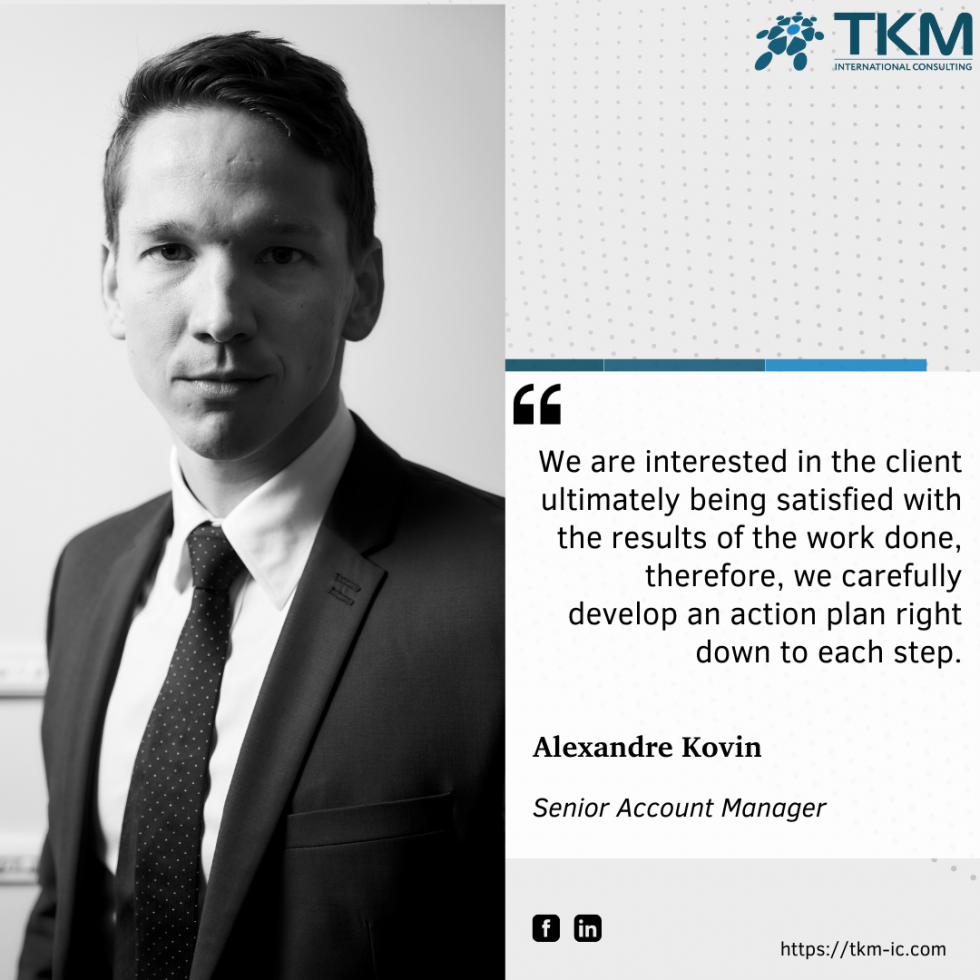
In order to better understand the basic principles of the company, its missions, vision and main goals, it is important to get acquainted with the team members who closely communicate with clients. By conveying information, shaping work approaches and assessing development dynamics of internal and external processes, they are the link between clients and our internal departments.
Alexandre Kovin, Senior Account Manager, shared his vision of current activities, services and products developed according to client's requests and demands in the fight against counterfeiting.
Below is a transcription of our latest interview with Alexandre, presenting TKM’s role and its approach when protecting brands:
- You have been working for TKM for about 4 years. How did it all start and why did the specifics seem interesting to you?
I wanted to work in my sphere of education and devote my time to both French and Russian law. In TKM I had the opportunity to do so. Moreover, I have gained valuable experience from interacting with large international clients: it is a great way to establish contact, gain new knowledge, exchange ideas and develop effective strategies to fight counterfeiting in all possible markets.
- In which markets does TKM fight counterfeiting, which country is the main focus? Why?
In this matter, everything depends on the category of counterfeit.
If we consider the specifics of alcoholic beverages, the main market we operate in is Russia. The large number of fakes here can be explained by Russia’s reputation as an alcohol lover. Indeed, in 2020 Russia entered the top-20 most drinking countries in the world. When parallely observed next to average wages and, in general, the current economic situation in the country, the upward trend in counterfeit alcohol and its consumption is quite predictable.
If we analyze the sphere of perfumery and clothing, it is worth focusing on the countries bordering China that let supplies get through to other countries. Therefore the greatest risk usually comes from Kazakhstan, Azerbaijan, Armenia, Georgia and Russia.
It also follows the Silk Road pattern - the transport system promoted by China, in cooperation with Kazakhstan, Russia and other countries, to move goods and passengers overland from China to European countries. For counterfeit manufacturers, this scheme is convenient, fast and profitable, whereas for copyright holders and legal providers it’s a heavily dangerous one due to cross-borders mouvements.
- Are anti-counterfeiting strategies different for different sectors (cosmetics, alcohol, clothes)?
Of course, the strategies are different.
First of all, strategies are developed individually for each client, based on their requests and areas of interest.
Secondly, our strategies are yearly adjusted based on our experience, work and analysis.
However, the preliminary strategy for clients always includes the analysis of the following factors:
- Market scale;
- Volume of sales;
- The scale of counterfeit products;
- Type of counterfeit;
- Problem assessment;
- Assessment of markets of interest and more.
Ultimately, what we want is for the client to be satisfied with the results of the work done, hence our thorough selection and development of the best fitting action plan, every step of the way.
- Why, in your opinion, are counterfeit products popular, and why does their demand continue to grow?
Again, this depends on the category of counterfeit.
If we look independently at the apparel industry, it is clear that social media and advertising significantly influence consumers. The consumer strives to copy the style of the blogger or star they like, to be similar to his idol.
Another key behaviour lays in counterfeit purchases due to the impossibility of buying an expensive brand or due to social pressure.
Finally, the possibility to stand out from the crowd is a strong motive leading to counterfeit product purchases.
On the alcoholic beverages market, the main reasons are somewhat different:
- the sale of counterfeit alcohol is carried out by deceiving the consumer (4/5 of purchases of counterfeit alcoholic beverages on the Russian market are linked to the consumer's ignorance of distinctive characteristics of originals).
- the remaining 1/5 of consumers are ready to drink counterfeit alcohol: they are aware they buy a fake. The motive is simple: the quality of the products is deemed acceptable while prices are much lower than originals.
- In your opinion, is it realistic to confront the offenders involved in the production and sale of counterfeit goods? Is it possible to defeat counterfeiting in general, and if so, how?
Undoubtedly. Our experience has shown that the right tactic when fighting counterfeits and the prompt actions of specialists allow us to start acting from the first found counterfeit product, all the way through to identifying contraband organisations.
In order to most effectively combat counterfeit products, it is necessary to use a combination of several elements at once:
- customs authorities (+ customs registers);
- the police;
- investigations carried out by company specialists;
- internet monitoring;
- lawyers.
It is very important that judicial practice and, more broadly, all actions of legal providers set a precedent for offenders, highlighting the consequences of their actions.
- What is your advice on effectively combating counterfeiting in Russia?
First of all, it is important to understand that the fight against counterfeit goods begins even with one unit of counterfeit, which will subsequently make it possible to identify large consignments of illegal products, as well as whole chains of contraband organizations and criminal groups.
Moreover, it is necessary to use customs registers, which make it possible to track the import of counterfeit goods into the country as quickly and efficiently as possible.
Finally, the most important factor is taking a complex approach to brand protection. Online and offline formats, monitoring, presence of counterfeits in raids and seizures, interaction with the police and customs, participation in the lawsuit, destruction of counterfeit - together they are key when fighting offenders and protecting consumers’ rights.